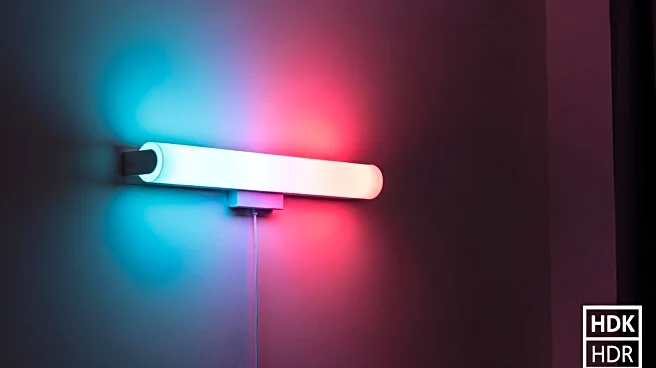What's Happening?
The Philips Hue Play Wall Washer, produced by Signify under the Philips Hue brand, is being marketed as a versatile lighting solution for home entertainment systems. This smart light is designed to enhance the visual experience by projecting colors onto walls, creating an immersive environment. The Wall Washer is a compact, upright lamp housed in a sturdy aluminum enclosure, capable of producing smooth color gradients. It is compatible with the Hue Bridge, allowing integration with various smart home platforms. The product is priced at $219.99, with additional costs for accessories like the Hue Play HDMI Sync Box and Hue Bridge, which are necessary for full functionality.
Why It's Important?
The introduction of the Philips Hue Play Wall Washer highlights the growing trend of integrating smart lighting into home entertainment setups. This product offers consumers the ability to enhance their viewing experience with dynamic lighting effects, potentially increasing the demand for smart home devices. However, the high cost of the Wall Washer and its accessories may limit its accessibility to a broader audience. The product's compatibility with major smart home platforms through the Hue Bridge also underscores the importance of interoperability in the smart home market, which could influence future product developments and consumer expectations.
What's Next?
As the market for smart home devices continues to expand, the Philips Hue Play Wall Washer may face competition from more affordable alternatives. Consumers may seek out less expensive options that offer similar functionality without the need for additional costly accessories. Additionally, the development of new smart home platforms could impact the product's compatibility and appeal. Signify may need to consider pricing strategies and product enhancements to maintain competitiveness and attract a wider customer base.
Beyond the Headlines
The Philips Hue Play Wall Washer's reliance on the Hue Bridge for full functionality raises questions about the long-term viability of proprietary smart home ecosystems. As the industry moves towards universal protocols like Matter, products that require specific hubs may face challenges in maintaining relevance. This shift could drive manufacturers to adopt more open standards, potentially leading to greater consumer choice and innovation in the smart home sector.











